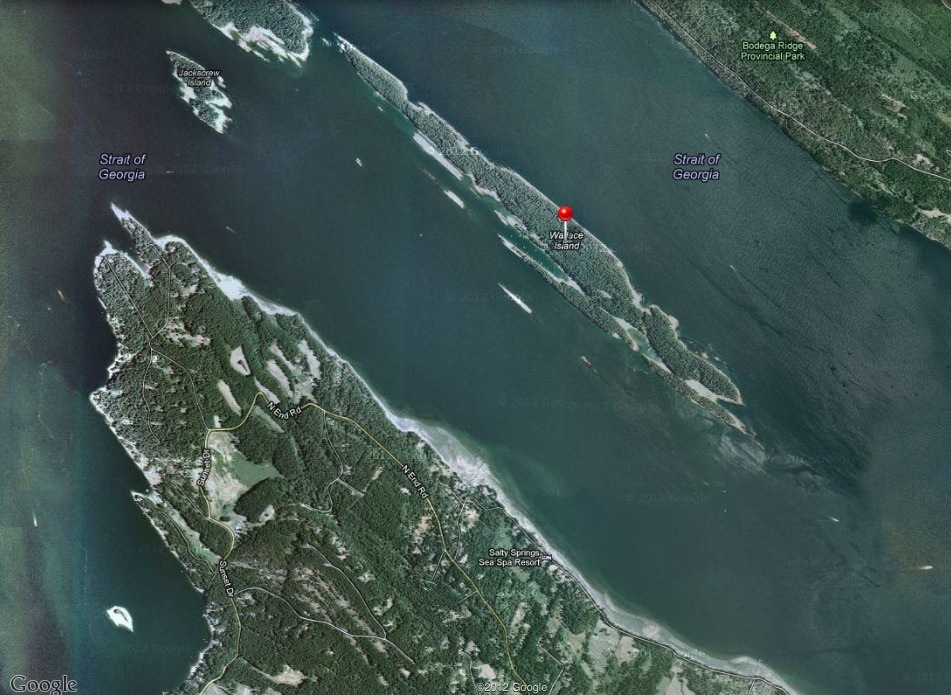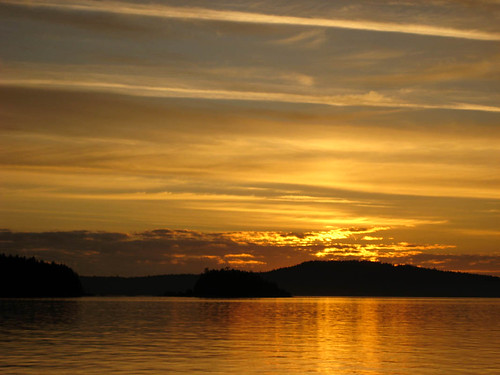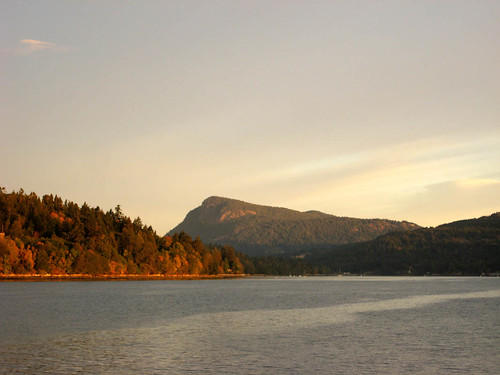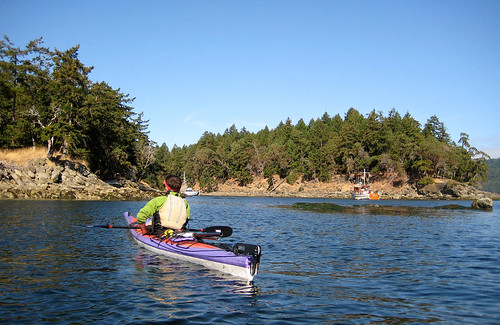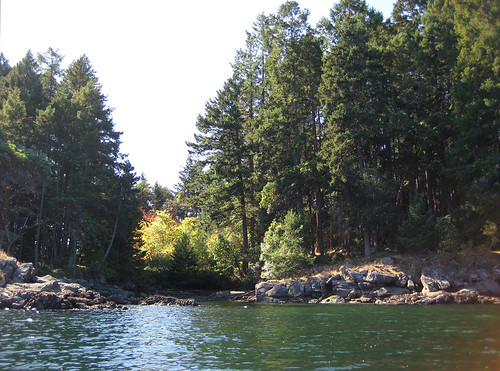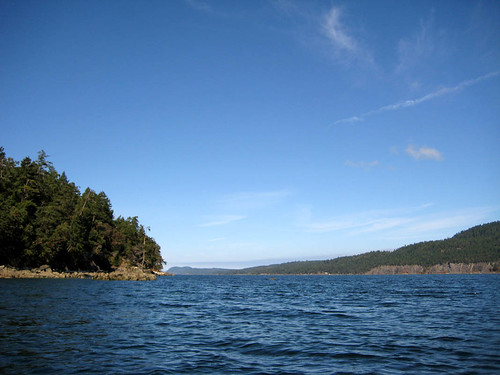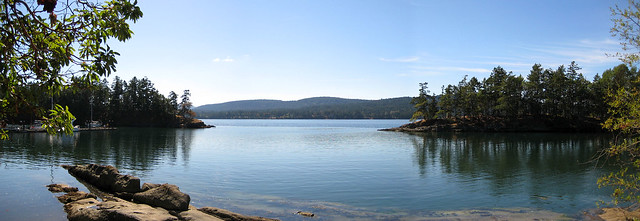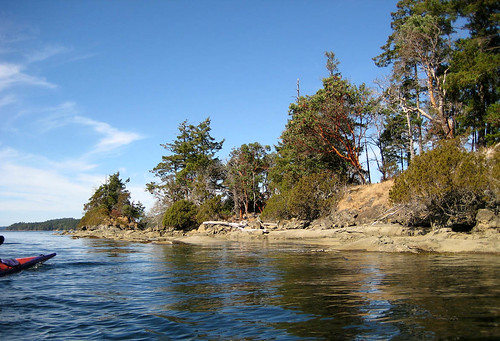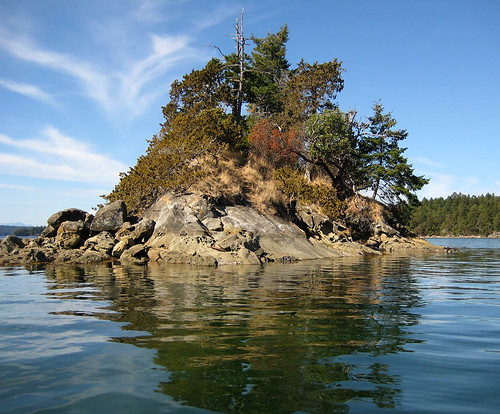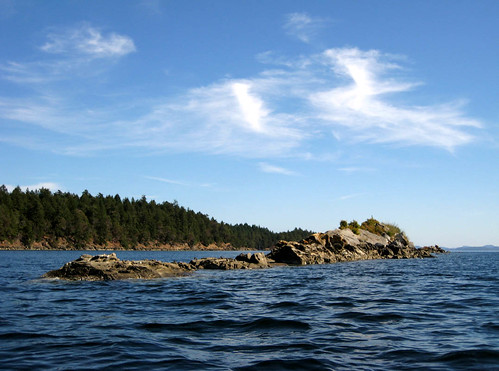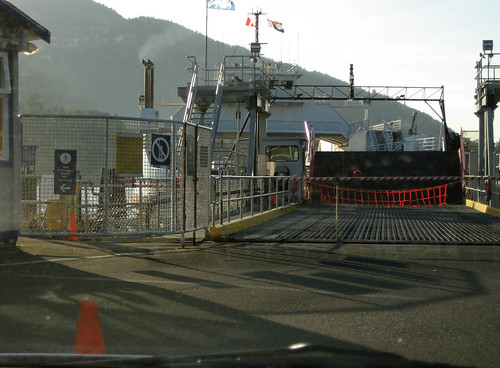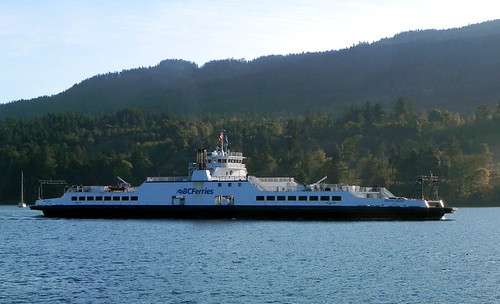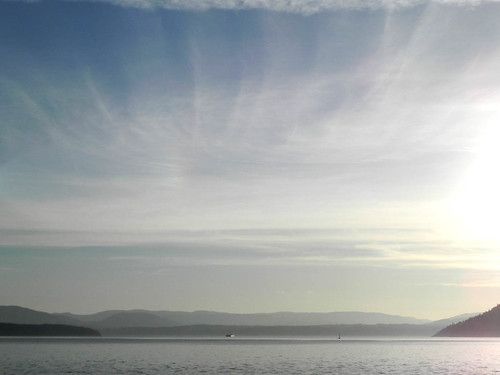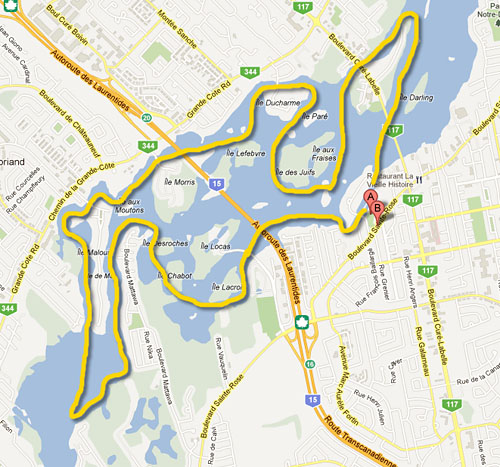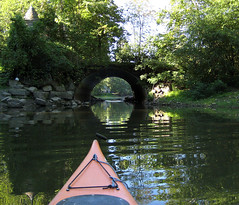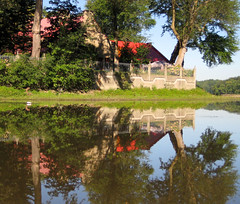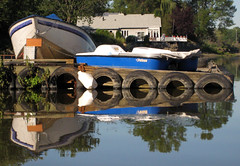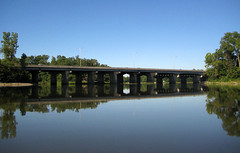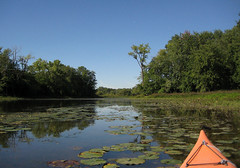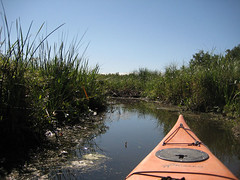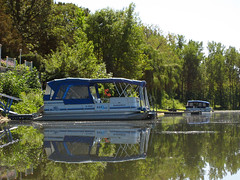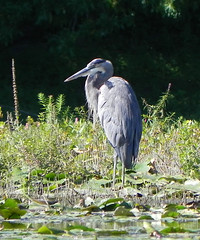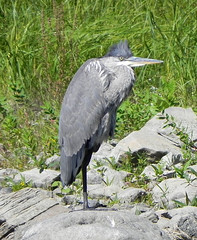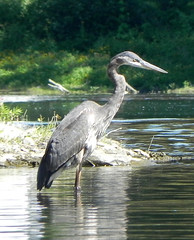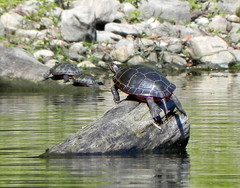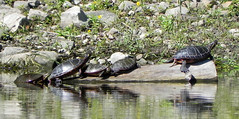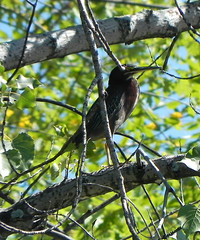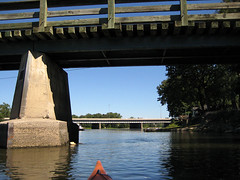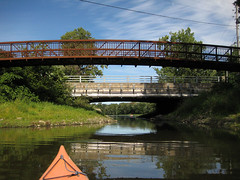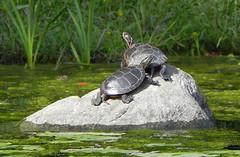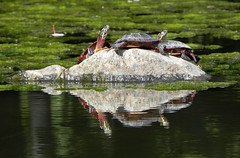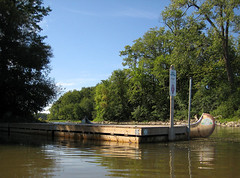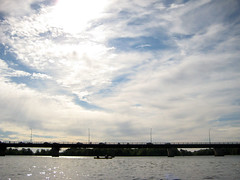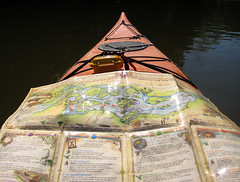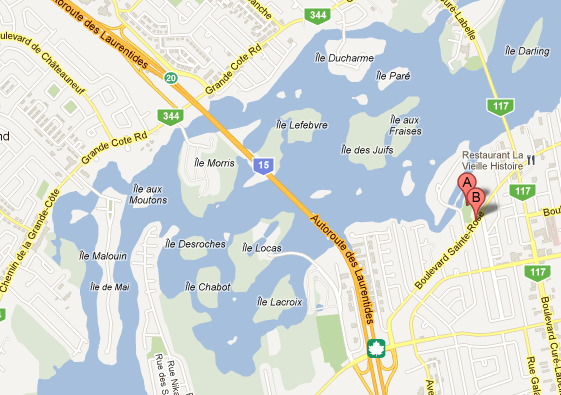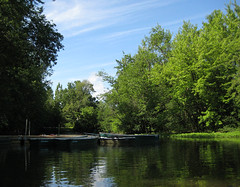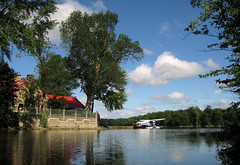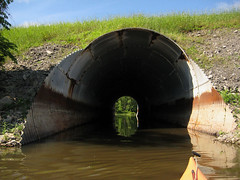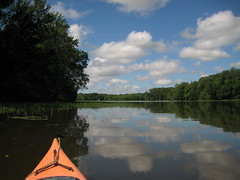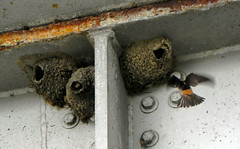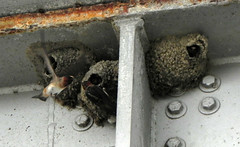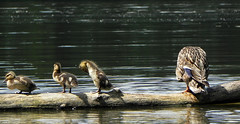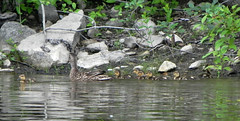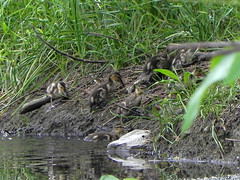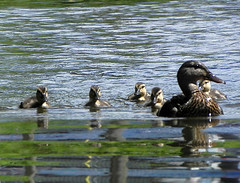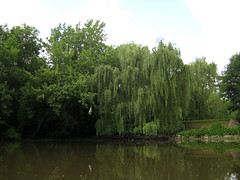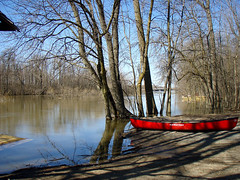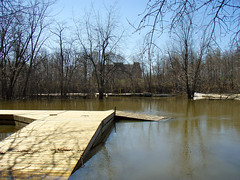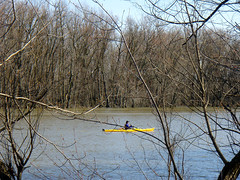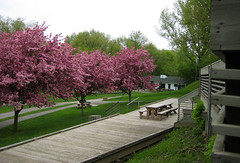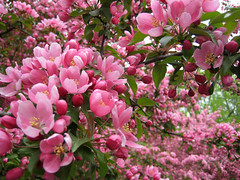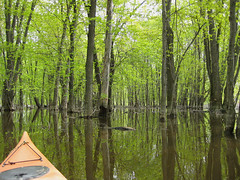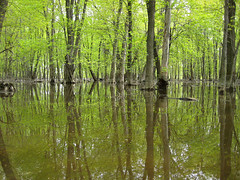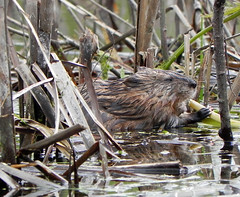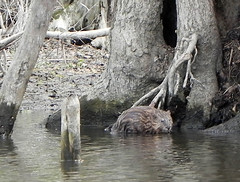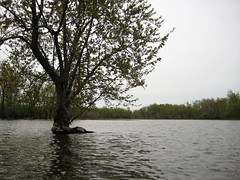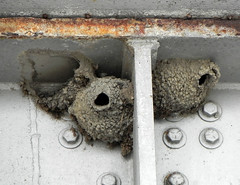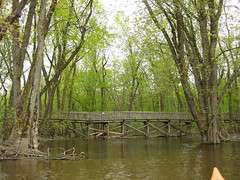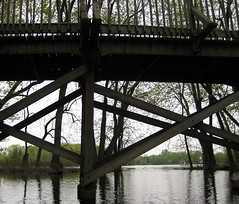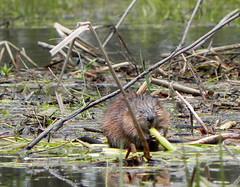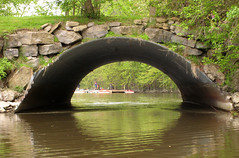A month after my first foray onto the river for 2014, I was back to see what change time had wrought.
The cherry trees were in full dark leaf, not a blossom to be seen. All the foliage was full and just losing the brilliant emerald of spring. The river had withdrawn from the grass and dropped enough to leave a lip of bank, maybe down about 3-4 feet, although the trees at the edge were still rooted in water.
I paddled up towards the bridge to Île Gagnon, but the current under the bridge still looked brisk, so I decided not to court a dunking quite so early, and turned back, past the launch site and out the Eastern end. Bright blue, cloudless sky, just enough wind to burr the water, water still very brown, silty and opaque. Quite a few kayaks and powerboats out amongst the islands.
I started out by crossing over to the lower part of Île de Juifs, to check whether the channel between Île de Jiufs and Île aux Fraises was still passable; it was, with sufficient attention to the inverted Vs in the water marking rocks. Water was still high enough that the greenery came right down to the water's edge, no bank visible. I paddled west up the channel and out the upstream end, past a spectacular deadfall.
Then west to Île Langlois and across to the south bank and the culvert alongside the Trans-Canada Highway / de Laurentides bridge, which was still passable, though not as much as a month ago. Sheltered, it was still, warm, and scummy, and ruled by red-winged blackbirds. From there I went uneventfully through the tunnel under the Autoroute de Laurentides and steered wide of the people fishing off the embankment to the bridge to Ile Locas. Still a stiff current coming under that bridge, but this time I was prepared for it, and did not get turned around in the eddy. I merely had to work a little. From the other side of the bridge I could see that the platform was once more out near the marsh.
I wanted to check out last month's flooded areas, given the drop in the water level. Île Lacroix had reemerged from the waters and was now fringed with spiky young reeds. A few points along the southern shore were still flooded, and with care I could work my way in amongst the trees and look back out, but the long contiguous passage towards the rear of the marsh that I had explored on my last outing was gone.
The marsh was wide open, with a thin but healthy growth of new reeds sketching in the usual summer limits (my usual panorama shot). I paddled through the reeds and debris, all the way into what later in summer will become an internal pond accessible only by a channel and then as the water drops further, becoming inaccessible. It was windless, with brilliant sunshine sparkling off any flaw in the water, and reeds and foliage perfectly mirrored. The bird watching platform had has been placed on what will probably be edge of the reeds, but right now was far out in the waters. In the still blanched reeds of the northern bank, a unseen heron wheeze-gronked at I don't know what: me? the people on the far bank? passing shadows? her mate? I saw two others in flight around the periphery of the marsh, dark against the emerald trees.
After that, I decided I needed a break, but although there were now several visible steps and a dock at Île Gagnon, there was no beach, and my last attempt at reentry from that dock had ended with me chest deep in warm river for several minutes while I worked out the technique for extracting both feet from the mud. So I circumnavigated the island looking for somewhere I could use as a pull-out that was fairly close to the path, I being in sandals, and not wanting to push my luck after escaping ill-effects from last time's excursions. I found a tree on the water's edge beside the lookout, and I used that as anchor and leverage to help me scramble out onto the slanting, stony, slippery bank. The paths were again paths, rather than canals. I ate my samosas and yoghurt sitting on the bench, and then walked along to the toilet, finding the path up to the toilet shed enthusiastically overgrown. The toilet roll had suffered the depredations of some nest-building critter – the outer layers were shredded, with drifts of small fragments trapped against the base of the shed.
We shall draw a veil over my re-entry. I avoided falling into the water, and I did not lose my sandals, my paddle, or my dignity, although I preserved the latter mainly by making sure no one was within view, and a notable amount of mud came into the cockpit with me.
I was tempted to go back to the marsh for some more photographs, since the sky had begun to fill up with photogenic pebbly white clouds. But there were other places to see. Crossing the main channel from Île des Juifs had convinced me I still did not want to wrestle with the downstream current past Île de Mais (and that I need to get myself into a gym next winter), particularly since a couple of power-boat and aquaskis were already tearing up the main channel. I headed across to the far side of the river to check out road bridge linking Île Morris and then the Pont Gédeon-Ouimet (the one I keep thinking of de Laurentides) for swallow's nests. I caught a glimpse of one or two birds, but the nests I saw were few, old and empty. I only spotted two families of ducklings, one quite mature, and one younger, although I saw very few female mallards.
With the water still high, I could work my way up the channel between Île Lefebvre and Île Morris, through mats of water-lilies and around stands of broken reeds, to the columns supporting the motorway bridge, which rested on mud and just enough water to float a kayak. Something is preying on the water-lily leaves: many of them were yellow, with concentric curving cuts, like paper art (there's a word, but that neuron is just not letting go). On the far side of the motorway bridge, beyond the water, was the rusted relic of an older bridge, one that looked more like a railway bridge than a roadway bridge. From there, I could look eastwards down the channel towards Île Saint-Mars and Île des Lys. As I cleared the reeds nearest the bridge, a flurry of splashing broke out behind me, repeated at intervals in an uneven circuit around the edge of the reeds, with flashes of scale and and fin and slaps on the water. I could track it … whatever it was … by the irregular motions of the reeds. My foremost hypothesis that one of the huge river carp was trying to eat something large and uncooperative – and I was torn between holding the paddle and or the camera, but as the disturbance began working its way towards me, I opted for the paddle, and a slow retreat. Top predator or not, I didn't want that brawl exploding under my keel.
All went quiet for a little while, until something splashed off a fallen log against the shore of Île Lefebvre. I expected to see a muskrat or a maybe even a beaver swimming away, but all I saw was the same pattern of twitching leaves and thrashing headed up towards the bridge. It dawned upon me that I was seeing the big fish brute-forcing their way through the obstacles of reeds and shallows. I tracked a third set of twitching reeds and ripples upstream on a similar transit to the second, during which a broad scaly back broke the surface and unfurled a dorsal fin the size of my five fingers. The closest I knowingly came to one of them was when my brain belatedly caught up with my eyes as I slid my paddle down between lily pads onto a long shadow. I don't know which was more startled, the fish or I.
I then crossed over to explore a section of the riverbank accessible from the shore by a raised walkway, which was still flooded enough to let me through into what must later in summer be a pasture. The water was shallow, still, clear, and noticeably amber, but clean enough to support an abundance of tiny fish, and the occasional larger one, passing through. And turtles. While I was on the landward side, a heron dropped in alongside my exit channel, but I was saved from the decision as to when to disturb it by a quartet of my fellow humans, tramping down the walkway. Not sure whether they even noticed the bird. I spread out my map on my deck to figure out where to go next, and took a panorama shot from the shade of the forest.
Since I'd been playing the 'I'll get the next bus' game with myself for two hours by then, I ducked down behind Île Ducharme to check its bridge for nests – no – and its pullouts for turtles – also no – although I was pleased to see one small house in particular restored from the damage it had suffered during a severe thunderstorm last July. Since I wanted to go under the bridge into the lagoon with the current, that then meant I had to go upstream and around the top of Ile Gagnon, which I did, again via the channel between Ile des Juifs and Ile aux Fraises, and then crossed the channel (and the current) west of Ile Chapleau and Ile Kennedy, took a panorama looking west from Ile Gagnon, and then paddled around the upstream side of Ile Gagnon and raced two kayaks and two canoes to the bridge (I came second). I was trying to get ahead of them in the queue, to make sure I caught my bus – the 1441 73 to Cartier. Despite a few suspenseful moments when it seemed the quartet in front of me at the return desk would never focus on the task at hand, I did.
